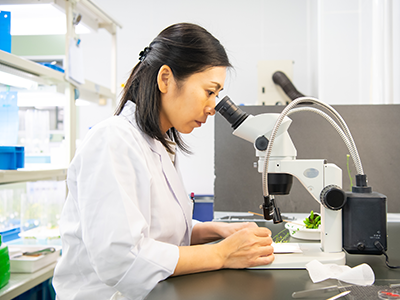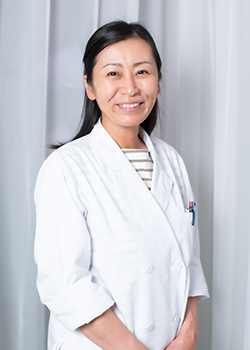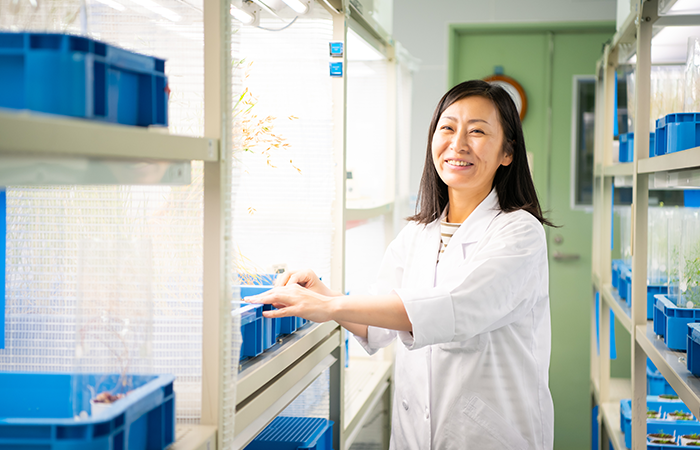The Joy of Noticing the Small Changes One Finds Through the Growth of Plants and Children
BRC is supported by a diverse staff who are involved in a variety of tasks. We have interviewed staff members from each of the 12 laboratories that make up BRC, asking them about their activities and their day-to-day efforts in their research rooms.
This time, we are speaking with Yoshiko Asakura, an Administrative Part-time Worker II, who works in the office of the Experimental Plant Division.
She was attracted by the keyword in the division’s name: Plant, which led her to join the division where she is engaged in preparation of plant resources centered on the multiplication and hybridization of model plants. In this session, we asked her about her job satisfaction and work-life balance.
Watching over the model plants used for various studies from sowing to harvesting
The reason I took this job was because I was attracted to a job opening at RIKEN BRC for a "plant-related" position. My parents’ home was in the countryside where there was an abundance of nature, and I have been interested in plants and living things in general ever since I was a child. When I was a student, I was studying in the Biology Laboratory of the Faculty of Education, but when I was looking for a job, I wanted to work in a fieldwork environment rather than a teaching profession, so I also worked as a nature guide. Then, after getting married, starting a family, and moving to a new city, I saw an opening for a "plant-related" position.
The Experimental Plant Division is responsible for the collection, preservation, propagation, testing, and provision of plant seeds, plant genetic material, and plant cell cultures, with a focus on Arabidopsis thaliana which is a representative experimental plant. We are also positively engaged in activities to develop and disseminate technologies related to plant resources.
In this division, I am currently in charge of all aspects of propagation of deposited seeds of the model plants Arabidopsis thaliana and Brachypodium distachyon, artificial pollination of wild strains of Arabidopsis thaliana, cultivation of plants requested by researchers, production and artificial pollination of plants for collaborative research, and so on.
We handle all aspects of plant cultivation wholly, from sowing to harvesting and seed collection. First, we make a culture medium for sowing seeds in petri dishes. We sow seeds there, and when they sprout and grow to a size where they can be replanted, we replant them in soil. The process that requires the most attention is manual pollination, in which a pistil of one strain is pollinated with pollen from another strain. It is a delicate process that is performed while looking through a microscope.
If the pollen is released even a little, Arabidopsis thaliana will self-pollinate and produce seeds. To ensure pollination from a different strain of pollen, the work needs to be done from the bud state before the flowers bloom. I judge the timing of crossbreeding myself by detecting subtle changes in the stamen tips, which swell and begin to form pollen. If pollination is successful, I take care of the plants by watering them, controlling the temperature, and providing other necessary care until the seeds are ready to be harvested.
Valuing the accumulation of each day’s experiences
The fascination of noticing changes in plants

Although nowadays I understand this entire sequence of events, I really had no idea what I was doing at the beginning. Initially it was difficult to get used to the new job, but I was able to discuss the progress of the work with my supervisor and so I gradually became accustomed to the job.
The division has an atmosphere in which the staff can immediately check and discuss any questions they have, so even beginners are able to take on challenges without any difficulties or worries about the work. Even if I made a mistake, when I reported it as soon as I noticed it, I was quickly given clear instructions that allowed me to recover. I think it is an environment in which communication is easy and it is a comfortable place to work.
In this division, I often realize that the work is meant to be undertaken in a cumulative way. For example, when I first learn about a certain task, I may have questions about it, but when I move on to the next task, the earlier task often makes sense.
I handle many different lines (strains) of model plants, and they differ slightly from one generation to the next, but the more I work with them, the more I naturally begin to see the differences between each line. The more I become aware of the differences, the more tasks I can do.
One thing I feel is important in this job is to make records and take notes carefully by myself. Whenever I receive new instructions or have any doubts, I immediately check my previous notes. Data management through barcode registration has also been introduced, and the recording system is now more robust than before, but the notes and notebooks in which I record detailed differences with my own hands remain important and fundamental.
What makes the work challenging and interesting is that although the plants grow very slowly, they are changing every day. In the past, I used to work four days a week taking Wednesdays off, but now that my child is a little older, after talking with the Director of my division I have increased my working week to five days. By being able to observe the plants every day, I was surprised to find that I was able to spot even minor changes that I had not noticed before.
I used to think that I was the type of person who would go out and take an interest in all kind of things, but since joining this division, I have started to develop an interest in the small things that happen in the room, and in noticing small details.
Aiming at finding a balance between childcare and work
Thankful for the support of the surrounding people

I am sure there are those who are able to fulfill themselves interactionally both while at work and at home, but since my child is still small, I switch my "work" mode OFF the moment I leave the workplace every day and focus on my home life. On the other hand, if I have had a quarrel with my child in the morning, I try to switch over as soon as I arrive in the workplace. Sometimes, during my lunch hour, I reset my mood by having lively conversations with the other laboratory staff. I’m really grateful to have so many senior colleagues at work that I can feel free to consult with about both professional and personal matters.
Since our work is focused on living things, it is difficult for everyone to take breaks at the same time, but in the wake of the COVID-19 pandemic, a system was also put in place whereby the entire staff can support each other to maintain the workplace.
I have parents in Tohoku, and when I suddenly had to go back home for a week last year, my supervisor and other staff in the cultivation room were very helpful in watering my plants and taking care of other things for me. I am grateful for the wonderful environment and the relationships I have with the people here, and I would like to continue working together with everyone around me, diligently taking care of the plants in the division and gradually increasing what I can do in my work.
Profile
- Yoshiko Asakura
- Administrative Part-time Worker II, Experimental Plant Division
- She joined RIKEN in 2016. During her student days, she was attached to the Biology Laboratory. She applied for a position at RIKEN BRC because she wanted to work with plants. Currently, she is involved in bioresource development of wild strains of Arabidopsis thaliana and other plants.
Release date : Nov 25, 2024
